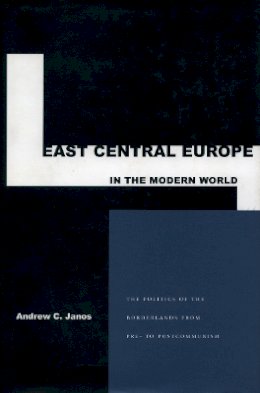
Stock image for illustration purposes only - book cover, edition or condition may vary.
East Central Europe in the Modern World: The Politics of the Borderlands from Pre- to Postcommunism
Andrew C. Janos
FREE Delivery in Ireland
Description for East Central Europe in the Modern World: The Politics of the Borderlands from Pre- to Postcommunism
Paperback. A study of East Central Europe and its place in the modern world. Combining narrative with analysis, it presents the past and present of East Central Europe in the larger context of the political and economic history of the continent. Num Pages: 512 pages, 5 maps. BIC Classification: 1DF; 1DV; HBJD; JP; KCZ. Category: (P) Professional & Vocational; (UP) Postgraduate, Research & Scholarly; (UU) Undergraduate. Dimension: 235 x 156 x 29. Weight in Grams: 712.
Combining engaging narrative with analytic power, this book presents the past and present of East Central Europe in the larger context of the political and economic history of the Continent.
The central theme of the book is best summarized by the familiar French proverb that the more things change the more they are the same. For while the historical experience of East Central Europe in the modern world may be described as one of endemic political change—from Western liberalism to corrupted parliamentarism, from fascism to state socialism imposed by the Soviet Union, and now to a fledgling new liberalism under ... Read moreWestern auspices—all these political systems faced the same stubborn facts of life: the region’s economic backwardness vis-à-vis the West, the debilities of small nationhood, and the cultural divide between the lands of eastern and western Christianity.
In dealing with this volatile mix of continuity and change, this book provides a new interpretation of the politics of the region in the modern period. At the same time, it also contributes to the ongoing dialogue among disciplines by attempting to strike a better balance between cultural and economic explanations of conflict, between structural and institutional approaches to politics, and, above all, between intra- and extra-societal forces that shape power and politics in national states.
For the purposes of this book, East Central Europe is defined as the territory of the historical precursors, and contemporary successors, of the eight lesser member states of the former Soviet Bloc.
Show Less
Product Details
Publisher
Stanford University Press
Place of Publication
Palo Alto, United States
Shipping Time
Usually ships in 15 to 20 working days
About Andrew C. Janos
Andrew C. Janos is Professor of Political Science at the University of California, Berkeley.
Reviews for East Central Europe in the Modern World: The Politics of the Borderlands from Pre- to Postcommunism
"[East Central Europe in the Modern World] will not just fascinate the expert but also greatly inform those seeking a more introductory account of the borderlands once again subject to such extensive change."—Canadian Journal of Political Science "This book is the culmination of a lifetime of academic research and thinking by one of the most prominent scholars of East Central ... Read moreEuropean politics. Janos employs an exhaustive historical survey of the region (including present-day Albania, Serbia-Montenegro, Macedonia, Slovenia, Croatia, Bosnia-Herzegovina, Bulgaria, Romania, Hungary, the Czech Republic, Slovakia, Poland, and the former German Democratic Republic) to develop a grand theory of political and economic development of the countries on Europe's periphery. Ambitious in scope and engagingly argued, Janos's book is well worth reading by any serious student of East European or postcommunist politics."—Journal of Interdisciplinary History "Andrew Janos, ever the astute observer of Europe's eastern flank, has done us all a great service by writing a thorough, highly readable, and yet provocative history of the political and economic evolution of east central Europe over the past two hundred years."—Slavic Review "This work constitutes a provocative introduction to the politics and economics of east central Europe, and its interdisciplinary character should make it of interest to a wide audience of political scientists, historians, and economists."—International Affairs "This book is the culmination of a lifetime of academic research and thinking by one of the most prominent scholars of East Central Europe. . . . Ambitious in scope and engagingly argued, Janos's book is well worth reading by any serious student of East European or postcommunist politics."—Journal of Interdisciplinary History Show Less

